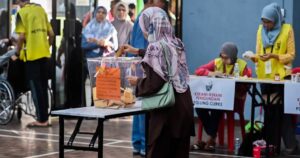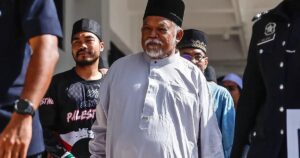
Kristian Tung’s record-breaking run in the 3000m did more than reset a stopwatch.
It cracked open questions that Malaysian athletics has avoided for decades — about history, structure, and whether this country still knows how to produce champions.
For nearly 40 years, the national 3000m record stood untouched, a relic from 1985.
It was a symbol of stasis — of how the nation once ruled the region’s tracks but slowly ceded ground, content to reminisce rather than renew.
Tung’s 8:15.81 in London did not just erase a number.
It challenged that complacency, demanding to know why a nation of millions has produced so few breakthroughs in middle and long-distance running since the glory days.
The context makes his feat startling. In distance running, records rarely fall by more than fractions.
A tenth of a second here, a blink there — that is the usual margin.
Tung didn’t just edge past the old mark. He bulldozed it by 11.19 seconds, a margin that in this sport amounts to an earthquake.
Never mind he finished 15th. It was the kind of performance that makes the athletics world stop and take notice.
Behind that lies a story of grit. Tung wasn’t a prodigy who won everything as a boy. Quite the opposite.
In school, he was beaten in race after race, often finishing far behind. What separated him was not talent alone, but stubbornness.
He kept coming back, piling on miles, and learning how to suffer.
From beaten schoolboy to record breaker — it’s a journey that explains why this breakthrough feels earned.
Today, that persistence has taken him to England, where he trains while studying sports science.
His weeks now involve running 120 to 130km, grinding through punishing sessions that would break most athletes.
In Malaysia, few can match that environment — the competition, the coaching, the culture of distance running.
Yet Tung has carried the flag into those trenches, proving Malaysians can compete when given the platform.
The result, said Federal Territory Athletics Association president V Pulainthiran, is “a game-changer.”
Pulainthiran, a former long-distance man himself, didn’t mince words. “Kristian has done what no one else managed in 40 years. We’ve been starving for this breakthrough.”
He will be pressing the case with youth and sports minister Hannah Yeoh. “If we don’t give him funding, facilities, and top-tier races in Europe and the US, we’ll reduce this to a one-race wonder.”
Then came the sting: “Our records from the 80s and 90s were mostly set abroad. Kristian has proved the formula again — talent needs exposure.
“If we keep him boxed in here, we waste his gift and kill the hope he’s just lit.”
But Pulainthiran’s voice has been lonely.
From Malaysia Athletics itself there has been only silence — no official statement, no rallying call, no sign that Tung’s feat will trigger systemic change.
It is a silence that says much about a body too often reactive, not visionary.
The irony is obvious. When Malaysia secures a “wild card” entry for the Olympics or the World Championships, the federation is quick to celebrate.
In recent years, that spotlight has fallen on Azeem Fahmi, the sprinter billed as the nation’s fastest man.
He looks the likely choice to take the slot for the World Championships in Tokyo next month, despite an inconsistent season in the 100m and his decision to skip December’s SEA Games in Thailand to prioritise his studies.
No one doubts Azeem’s talent or his right to chart his own course.
But the obsession with a single sprinter, while ignoring a record-shattering breakthrough like Tung’s, reveals a narrowness that continues to hobble Malaysian athletics.
Where there should be strategy, there is short-term excitement. Where there should be planning, there is drift.
Shadows of the past
Pulainthiran’s point echoes through Malaysia’s track history. In the 1960s, Dr M Jegathesan was Asia’s fastest man, setting records that stood for decades.
M Ramachandran remains synonymous with Malaysian endurance in the 80s and 90s: a nine-time SEA Games gold medallist, he set national marks in the 5,000m and 10,000m that remain untouched.
But instead of building on those foundations, the system stagnated.
Coaching pathways narrowed, grassroots programmes thinned, and track meets became less competitive.
For a generation, the narrative was that Malaysians “just weren’t built” for distance running, an excuse that ignored the fact that East Africans, once dismissed in similar terms, rewrote global athletics through structure, science, and sheer belief.
That mindset is precisely what Tung has shattered. His 8:15.81 does not yet threaten the Asian elite, where Japanese and Chinese runners regularly dip below eight minutes.
But it puts him firmly into conversations where Malaysians have been absent for too long.
It also raises the uncomfortable question: why did it take nearly 40 years for a record to fall?
Structural flaws exposed
The answer lies in the architecture of Malaysian sport. Too much has been left to chance — a few schools producing occasional talents, state associations struggling for funds, and a national body often more focused on survival than vision.
Promising runners are sent to the SEA Games or Asian meets without exposure to the competitive depth they would face abroad.
Too often, the gap in intensity becomes a wall.
The comparison with Japan is instructive. There, the Ekiden relay culture — corporate-backed road races drawing millions of spectators — sustains a conveyor belt of distance runners.
In Kenya and Ethiopia, running is not just sport but economy, with training camps, altitude systems, and relentless competition.
In Malaysia, by contrast, distance running often survives on personal grit rather than institutional design.
Tung’s case underlines the problem. To chase his potential, he had to leave.
England provided him not just with competition, but with training groups where running 120km a week is the norm, not the exception.
It gave him science, structure, and a culture where middle- and long-distance running matters.
Malaysia has struggled to replicate that ecosystem.
The fork in the road
Tung’s breakthrough offers athletics a fork in the road. It can either be celebrated as a one-off — another story to sit alongside a host of greats holding long-standing marks — or it can serve as the spark for reform.
That means more than just praising him. It means building a system where his feat is repeatable.
That requires investment in grassroots coaching, in competitive depth, and in sending runners abroad not as a luxury but as necessity.
It means treating athletics not as an afterthought to football or badminton, but as a fundamental sporting culture that once defined Malaysia’s pride.
For Tung himself, the answer lies in the same stubbornness that carried him from last-place schoolboy to national record holder.
He will keep running, keep pushing, keep trying to carve out those precious seconds.
The question is whether Malaysian athletics will finally run with him — or keep silent, as it has so far.
The views expressed are those of the writer and do not necessarily reflect those of FMT.






